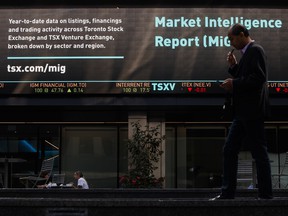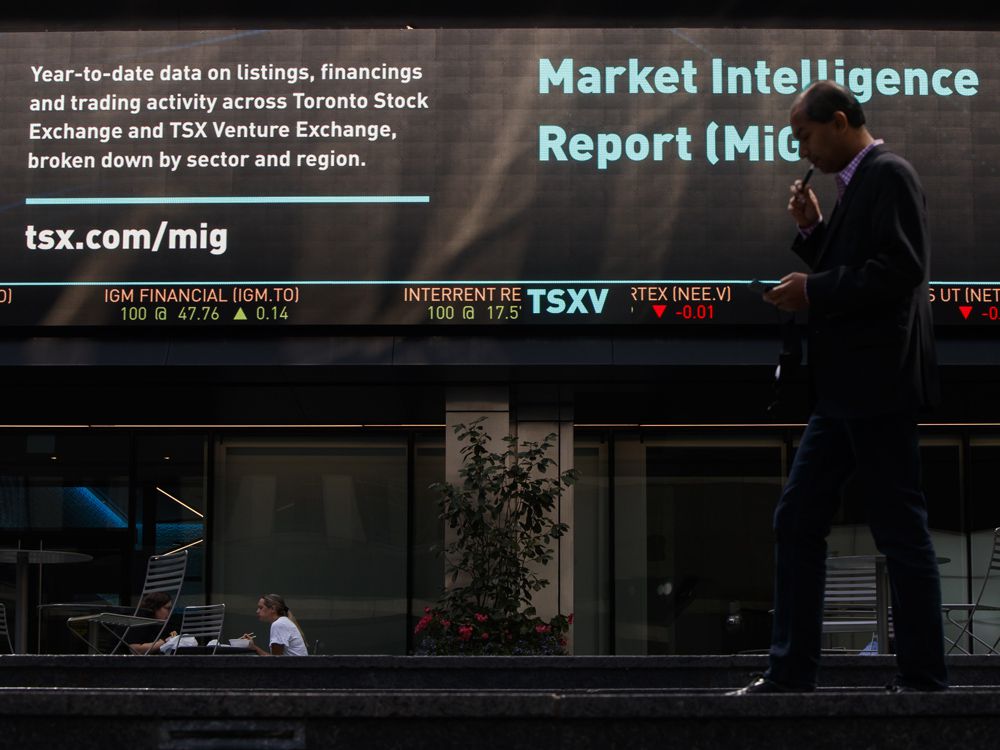Links to breadcrumbs
Personal Finance
Here are some key questions to ask and keep in mind when interviewing a potential advisor
 A pedestrian passes in front of the Toronto Stock Exchange in Toronto’s financial district. Photo by Cole Burston/Bloomberg files
A pedestrian passes in front of the Toronto Stock Exchange in Toronto’s financial district. Photo by Cole Burston/Bloomberg files
Reviews and recommendations are unbiased and products are selected independently. Postmedia may earn an affiliate commission for purchases made through links on this page.
Article content
Perhaps you are already working with an advisor and want to start a new relationship, or you have built up savings and your situation now needs planning advice. In any case, you are looking for an advisor who suits you and with whom you feel comfortable.
Advertisement 2
This ad hasn’t loaded yet, but your article continues below.
Article content
A quick Google search of “ask a potential financial advisor” will bring up some of the most common ones: What’s your experience? What are your references? What costs do I pay and how are you reimbursed? What kind of clients do you work with and what sets you apart from other advisors? These are all good questions to ask, but they are also questions most advisors are willing to answer.
Here are some other important questions to ask and keep in mind when interviewing a potential financial advisor.
What is your investment philosophy? Does the advisor have a clear and defined investment philosophy with access to a wide range of investments? Are they disciplined or do they follow trends? Do they focus on a broad asset allocation or specific sectors? Ask early and make sure you are comfortable with how your portfolio will be managed.
Advertisement 3
This ad hasn’t loaded yet, but your article continues below.
Article content
What kind of volatility can I expect with my portfolio? Look for consistent and stable returns and ask how much volatility other clients have experienced in years like 2020. In March of that year, equity markets experienced a significant correction, but most investors who stayed on track would have seen their portfolios recover and gain from the end of the year. Ask yourself what level of volatility you’re comfortable with, as investors often make emotional decisions during times of heightened volatility, and an experienced financial advisor can help you manage your behavior so you don’t miss out on a market recovery.
How much cash flow is my portfolio expected to generate? My colleague, James McCarthy, a senior asset manager at Nicola Wealth, recently shared with the Financial Post why cash flow investing is a strategy to consider in times of heightened market volatility. Cash flow (dividends, interest, rents) is an important number to keep track of when you retire or need income from your portfolio to live on. Ask whether the portfolio’s cash flow is reported separately from the portfolio’s total return.
Advertisement 4
This ad hasn’t loaded yet, but your article continues below.
Article content
What kind of planning have you done for other clients? The answer to this question will give you a good idea of the level of planning they do and the type of clients they work with. In their podcast Investing Matters: The Value of Advice, my colleagues, wealth advisers Ethan Astaneh and Kyle Westhaver, discuss the true value of financial advice and integrated planning. Not all value-added services show up on investment or management fees, and the right planning can have a huge impact on your long-term financial situation.
A good indication of the level of planning to expect is the type of questions asked during your initial meetings. What is the level of detail asked about your situation? Does the advisor ask for copies of your tax returns, annual accounts, wills and other estate planning documents?
Advertisement 5
This ad hasn’t loaded yet, but your article continues below.
Article content
If you are a business owner, have they asked if you have a succession plan? Have they requested a meeting with your outside advisors? A red flag is if you get advice before the advisor has taken the time to get to know your situation.
Do you work with my external advisors? Collaboration with your other professional advisers, such as your accountant and lawyer, is important in an integrated planning approach. You want your team of advisors to work together to achieve your goals.

How to deal with difficult conversations about finances and health with your elderly parents

A kitchen reno put a dent in this Alberta teacher’s TFSA. Now she has to catch up for her retirement

RRSPs vs TFSAs: a credit advisor weighs in on the debate
Advertisement 6
This ad hasn’t loaded yet, but your article continues below.
Article content
Who makes up your advisory team? Ideally, the relationship you establish with your financial advisor is long-term. Some advisors work alone, others work in a team. The person you initially meet may not be the only person you interact with regularly, so ask who supports them and who will be available in their absence. Who is your main point of contact?
What type of reporting can I expect? This is often something that you don’t think about until a few months after the relationship when you have questions about what your return and profit, after all costs, has been. You may find the investment, compensation and tax return provided disappointing. Request sample reports from customers in advance so that you know what to expect and how often you will receive them.
Advertisement 7
This ad hasn’t loaded yet, but your article continues below.
Article content
With online customer access and mobile apps, you can expect regular and up-to-date reporting data. Also, make sure your accountant gets enough information to file your personal and business returns.
The above questions will eventually lead to other conversations, but one thing is certain: the right financial advisor can be worth every penny of the fees you pay and can make you successful for years to come.
Perhaps most importantly, you have a strong sense of trust and comfort with your financial advisor, as they are often the first person to call when you have a life-changing event.
Jennifer Leathem, CFP, CIM, is a financial advisor to Nicola Wealth. This article should not be construed as investment advice or a recommendation for any particular security, strategy or investment product. All investments involve risk and may gain or lose value. Nicola Wealth is registered as a portfolio manager, exempt market dealer and mutual fund manager with the required provincial securities commissions.
†
Sign up for the FP Investor newsletter for more stories like this.
†
Share this article in your social network
Advertisement
This ad hasn’t loaded yet, but your article continues below.
Top Financial Messaging Stories
By clicking the sign up button, you agree to receive the above newsletter from Postmedia Network Inc. receive. You can unsubscribe at any time by clicking the unsubscribe link at the bottom of our emails. Postmedia Network Inc. † 365 Bloor Street East, Toronto, Ontario, M4W 3L4 | 416-383-2300
Thanks for signing up!
Comments
Postmedia is committed to maintaining a lively yet civilized discussion forum and encourages all readers to share their thoughts on our articles. It can take up to an hour for comments to be moderated before appearing on the site. We ask that you keep your comments relevant and respectful. We’ve enabled email notifications – you’ll now receive an email when you get a reply to your comment, there’s an update to a comment thread you’re following, or a user follows comments. Visit our Community Guidelines for more information and details on how to adjust your email settings.
This post Seven questions to make sure your financial advisor is right for your unique needs
was original published at “https://financialpost.com/personal-finance/seven-questions-to-make-sure-your-financial-adviser-fits-your-unique-needs”





